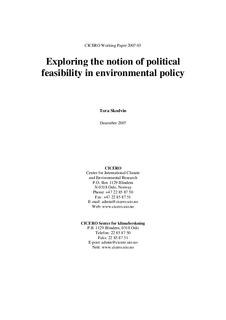| dc.contributor.author | Skodvin, Tora | nb_NO |
| dc.date.accessioned | 2014-03-17T14:31:19Z | |
| dc.date.available | 2014-03-17T14:31:19Z | |
| dc.date.issued | 2007 | nb_NO |
| dc.identifier.issn | 0504-452X | nb_NO |
| dc.identifier.uri | http://hdl.handle.net/11250/192286 | |
| dc.description.abstract | This essay explores the notion of political feasibility in environmental policy with an aim to develop an analytical approach that incorporates key aspects from both economics and political science. It assesses some of the relevant literature on political feasibility with a main focus on which sets of factors may make it more difficult for policy to achieve the necessary support – that is, which factors may serve to constrain policymakers’ “freedom of choice” of policies and policy instruments. The discussion indicates that political feasibility may be seen as a function of three main categories of constraints: 1) the distribution of costs and benefits associated with environmental regulation among target groups; 2) the distribution of power among and between target groups and decision-makers; and 3) the institutional setting within which decision-making takes place. | nb_NO |
| dc.language.iso | eng | nb_NO |
| dc.publisher | CICERO Center for International Climate and Environmental Research - Oslo | nb_NO |
| dc.relation.ispartof | CICERO Working Paper | nb_NO |
| dc.relation.ispartofseries | CICERO Working Paper;2007:03 | nb_NO |
| dc.title | Exploring the notion of political feasibility in environmental policy | nb_NO |
| dc.type | Working paper | nb_NO |
| dc.source.pagenumber | 10 | nb_NO |
